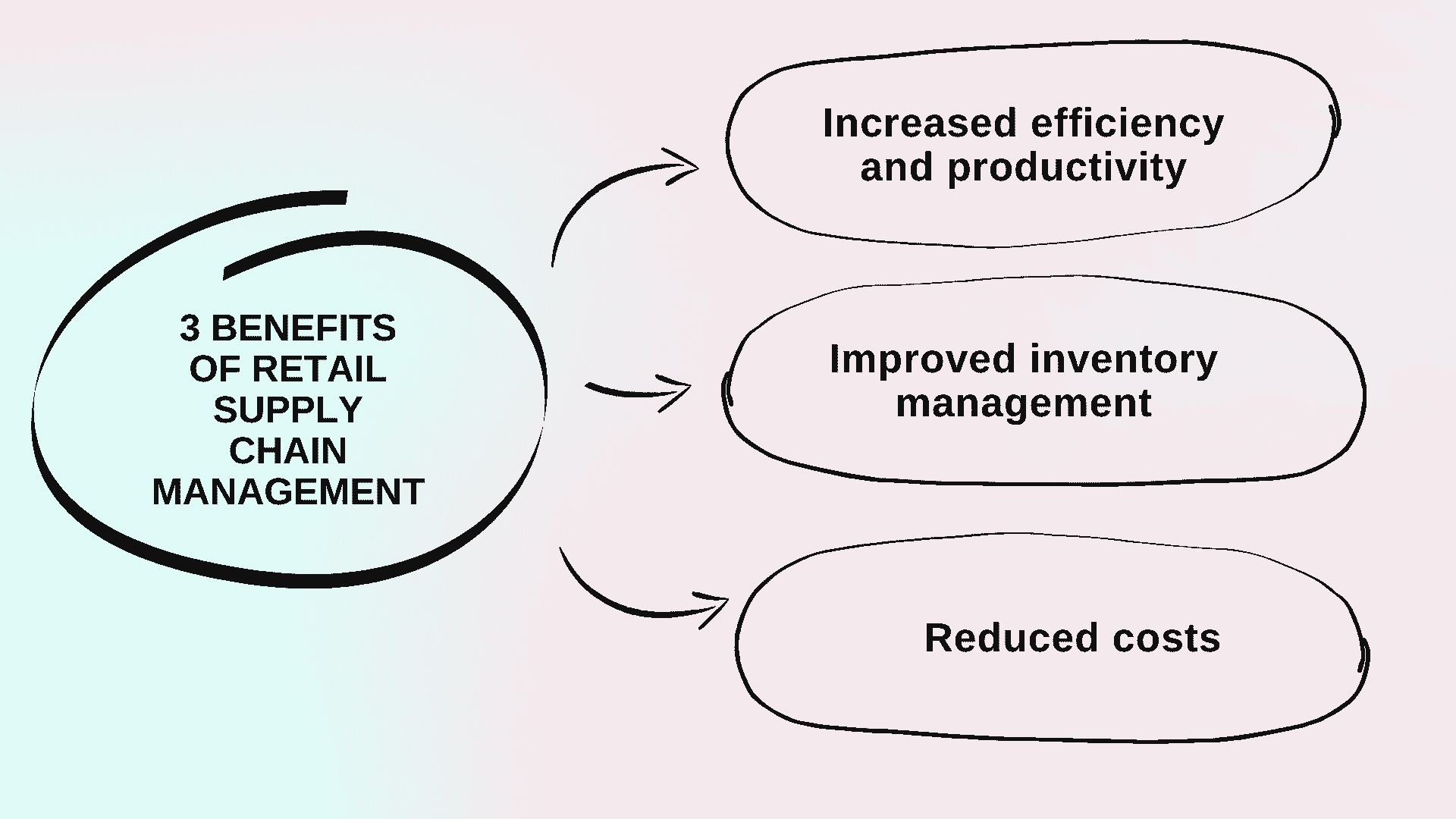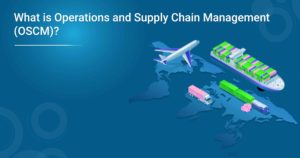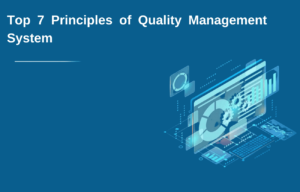The retail industry is one of the essential industries in the world. It is the link between manufacturers and consumers and is responsible for providing people with all the needed goods and services they need. Therefore, a retail business’s supply chain management (SCM) is of paramount significance.
SCM is all about handling the flow of goods and resources from suppliers to customers, and it includes everything from procurement and logistics to warehousing and inventory management. A well-managed supply chain can make or break a retail business, so it is essential to get it right. This blog post will look at the importance of SCM in the retail industry and some of the challenges involved.
What is Retail Supply Chain Management?
Retailers are under constant pressure to keep up with the latest trends, stock the hottest items, and deliver goods quickly and efficiently. To meet these demands, retailers rely on supply chain management (SCM) to streamline their operations and ensure a steady flow of goods from suppliers to customers.
SCM is a broad term that encompasses all activities involved in getting products from suppliers to customers, including sourcing, procurement, manufacturing, warehousing, transportation, and customer service. By optimizing each stage of the supply chain, retailers can improve their efficiency and responsiveness while reducing costs.
A well-run retail supply chain must be able to accommodate each retailer’s unique needs. For example, a fashion retailer will have different SCM requirements than a grocery store. However, there are some common SCM challenges that all retailers face, such as managing inventory levels, dealing with seasonality, and dealing with Returns/Exchanges.
Inventory management is a vital part of retail SCM. Retailers must strike a balance between having too much inventory (which ties up capital and incurs storage costs) and too little inventory (which can lead to stock-outs and lost sales). Seasonality is another challenge that retailers must manage; for example, demand for winter clothing is typically higher in December than in January. And finally, Returns/Exchanges can be a high cost for retailers.
Explain 3 Benefits of Retail Supply Chain Management
In the retail industry, supply chain management (SCM) manages the flow of goods and services from suppliers to customers. Retail SCM includes all activities involved in planning, sourcing, making, delivering, and returning products and services to retailers.
Retail Supply Chain Management aims to provide the customer with the right product in the most efficient manner. To do this, retailers must have an efficient and effective supply chain.
There are many benefits of having a sound retail SCM system in place. Here are three of them:
- Increased efficiency and productivity: A well-managed supply chain can help increase efficiency and productivity throughout the entire organization. It can lead to cost savings for the company and increased customer satisfaction. By simplifying processes and enhancing communication between different departments, everyone can work more effectively towards a common goal.
- Improved inventory management: Good inventory management is essential for any business, but it is imperative in the retail industry, where stock levels must be constantly monitored. A well-managed supply chain can help ensure that inventory levels are kept at optimum levels so that customers can always find the products they need when they need them. Our AI Supply Chain Management course provides essential skills and knowledge to achieve this level of efficiency.
- Reduced costs: An efficient supply chain can help reduce costs throughout the entire organization. When processes are streamlined, and communication is improved, businesses can save money on things like transportation, warehousing, and staff expenses.
How To Improve Retail SCM?
SCM is about organizing the flow of goods and resources throughout a company. In the retail industry, supply chain management is critical to ensuring that products are delivered to stores and customers promptly and efficiently.
There are several ways to improve retail supply chain management, including:
- Improve communication and coordination between different parts of the supply chain.
- Use technology to track inventory levels and product movement throughout the supply chain.
- Work with suppliers to streamline operations and reduce costs.
- Implement just-in-time manufacturing and delivery methods to minimize inventory costs.
- Use lean manufacturing techniques to reduce waste throughout the production process.
What Are The 5 Signs To Improve Retail Supply Chain Management?
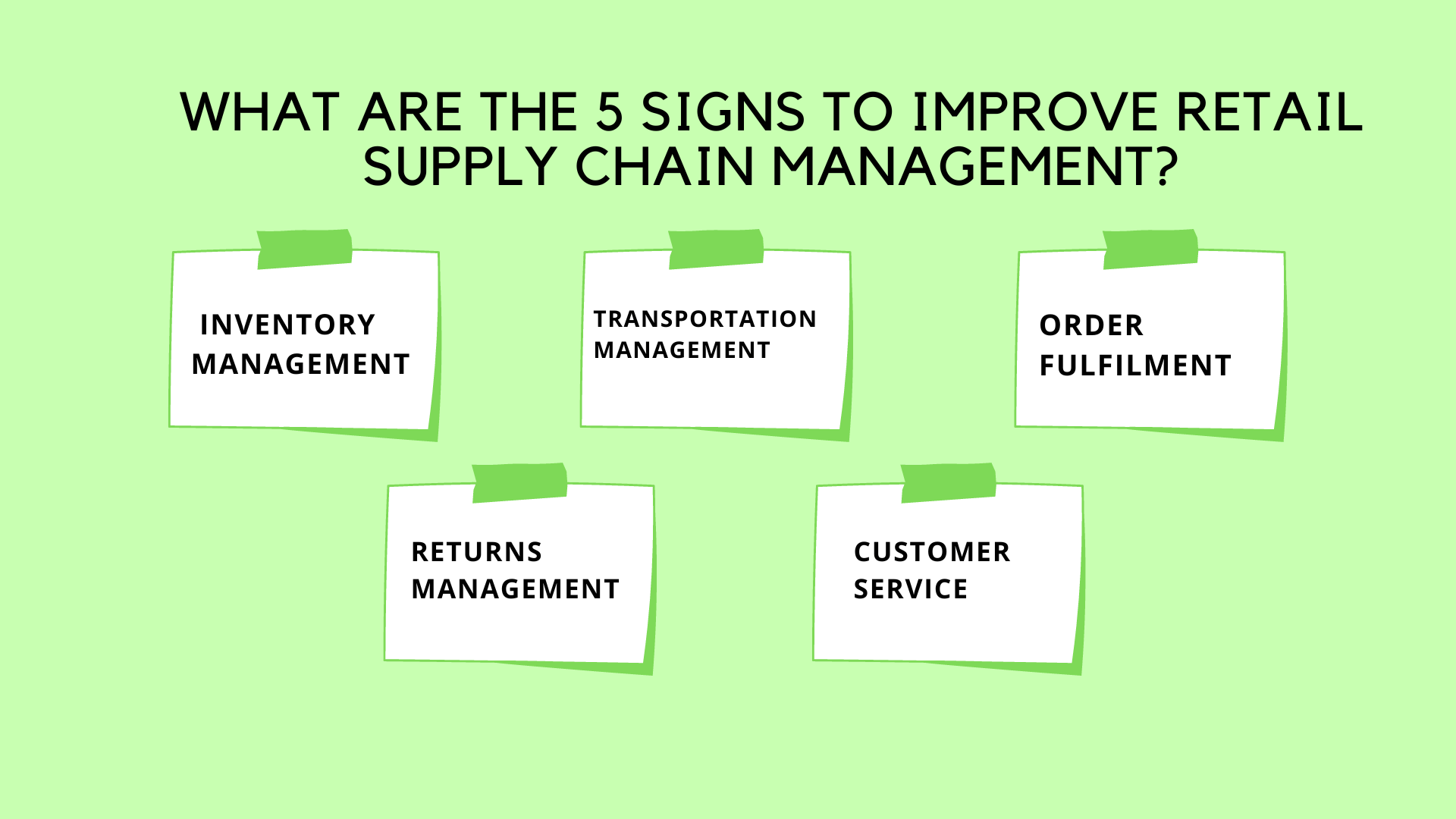
- Inventory management: Too much inventory can bind working capital and lead to storage costs, while insufficient inventory can lead to lost sales and frustrated customers. The ideal way to strike a balance between the two extremes.
- Transportation management: An efficient transportation system is crucial for promptly getting goods from suppliers to retail stores.
- Order fulfilment: Ensuring orders are fulfilled accurately and efficiently is critical for customer satisfaction.
- Returns management: An effective returns management process ensures that returned merchandise is handled quickly and efficiently, minimizing the impact on the rest of the supply chain.
- Customer service: Excellent customer service is essential for keeping customers happy and ensuring they keep coming back.
How is SCM Helping the Retail Industry To Grow?
The term ‘supply chain management has become quite popular in the contemporary business world. It is defined as a strategic and organized approach to managing the inflow and outflow of goods, services, and information between different parts of an organization or company.
In other words, it integrates and coordinates all activities concerning the acquisition of raw materials, their conversion into finished products, and their distribution to customers. The main purpose of supply chain management is to reduce cost and time while ensuring quality standards are met.
The retail industry is one sector that has adopted supply chain management practices on a large scale to remain competitive and grow. The pressure on retailers to provide customers with value for money, good quality products, and a satisfying shopping experience has never been more significant. To meet these challenges, retailers must have efficient and effective supply chains.
An efficient supply chain enables retailers to source goods at the right price from suppliers who can deliver them on time. It also allows retailers to get products to their stores quickly and efficiently, making them available for customers when they want them. In addition, an effective supply chain enables retailers to respond promptly to changes in customer demand so that they can stock the right products at all times.
The benefits of supply chain management for retail businesses are numerous. By having an efficient and effective supply chain in place, retailers can save money, improve customer service, and respond quickly to changes in customer demand.
What is The Importance of Retail Supply Chain Management Software?
- Retail supply chain management software can help to streamline and automate inventory management, order fulfilment, and other critical supply chain processes.
- By optimizing these processes, retailers can improve their operational efficiency and meet customer demands better.
- Additionally, retail supply chain management software can provide valuable insights into trends and patterns that can help retailers make more informed decisions about their inventory levels and stocking strategies.
- Furthermore, an excellent retail supply chain management system can help improve communication and collaboration between different supply chain members, such as suppliers, manufacturers, logistics providers, and retailers.
- Ultimately, using retail supply chain management software can help retailers save time and money while also delivering a better customer experience.
Challenges in Retail SCM
The retail industry is one of the essential industries in the world, and supply chain management is critical. The retail supply chain includes all the activities to get the products from the suppliers to the customers.
The main challenge in retail supply chain management is keeping the inventory levels low while still being able to meet customer demand. This is because too much inventory can tie up capital and lead to storage and handling costs, while too little inventory can lead to stock-outs and lost sales.
Another challenge is managing the large number of SKUs (stock-keeping units) that are typically found in a retail environment. This is because each SKU needs to be tracked separately, which can lead to complexity and errors in the system.
Another challenge is dealing with returns and refunds, as these need to be processed quickly and efficiently to keep customers happy. Finally, there is also the challenge of dealing with seasonal peaks in demand, such as during holidays.
Steps to Overcome Challenges in Retail Supply Chain Management
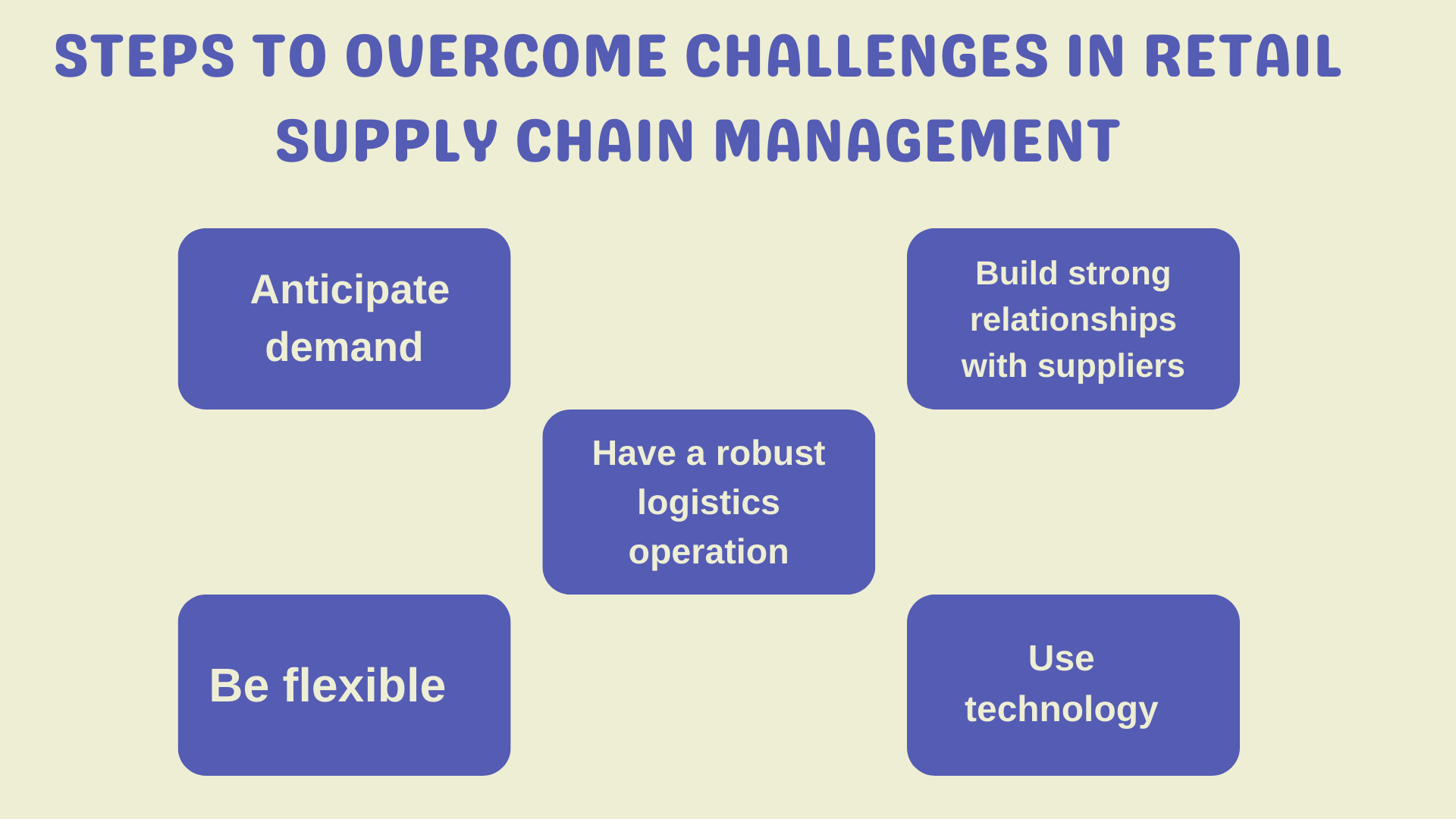
- Anticipate demand: To overcome challenges in retail supply chain management, it is essential to anticipate consumer demand. This can be done through effective market research and analysis.
- Build strong relationships with suppliers: Strong relationships with suppliers are essential to ensure a reliable supply of goods. Building trust and communication with suppliers can help avoid disruptions in the supply chain.
- Have a robust logistics operation: A well-functioning logistics operation is critical to successful retail supply chain management. Having efficient systems in place for ordering, warehousing, and transportation can help avoid disruptions and ensure the timely delivery of goods to consumers.
- Be flexible: Adapting to changing conditions is vital in retail supply chain management. For example, quickly adjusting production schedules or altering shipping routes in response to changes in demand can help avoid stock-outs or other disruptions.
- Use technology: Technology can be used to improve visibility and coordination throughout the retail supply chain. For instance, using barcodes and RFID tags can help track inventory levels and location, while software tools can automate many activities, such as order placement and tracking.
What Is The Future Awaits For Retail SCM?
The future of retail supply chain management lies in the ability to meet customer demands efficiently and effectively. To get this done, retailers need to forecast customer demand accurately and have a well-organized supply chain that can respond quickly to changes in demand. Additionally, retailers need to have visibility into their supply chain so they can identify issues and make necessary adjustments.
Technology will play a significant role in enabling retailers to meet these challenges. For example, artificial intelligence (AI) can be used for demand forecasting, while blockchain can provide visibility into the supply chain. Additionally, 3D printing can create custom products on demand, which could further help shorten lead times and improve responsiveness.
As the retail landscape continues to evolve, retailers must stay ahead of the curve by investing in cutting-edge technologies that will enable them to better meet their customers’ needs.
The future of SCM in the retail industry is inspiring. In recent years, we have seen a drastic increase in the use of technology to manage and monitor inventory levels, track shipments, and optimize routes. This has allowed retailers to become more efficient and responsive to customer demand.
In the coming years, we will witness even more technological advances that will further improve the efficiency of supply chains. For example, RFID tags will become more prevalent, allowing retailers to track individual items throughout the supply chain from production to the point of sale. This will enable retailers to better manage their inventory levels and ensure they always have the right products in stock.
Additionally, we will see increasing use of data analytics in retail supply chain management. Data analytics can identify patterns and trends in customer behaviour, which can make informed decisions about where to source products and how best to fulfil customer orders. This will help retailers reduce costs and improve customer satisfaction levels.
Overall, the future of retail supply chain management is very bright. With continued advances in technology and data analytics, we can expect even more efficiency gains that will benefit both retailers and consumers.
Conclusion
The retail industry is constantly evolving, and supply chain management is a vital part of that. By understanding the needs of the retail industry and challenges, supply chain management can help to ensure that retailers can meet customer demand and stay ahead of the competition. By working together, retail and supply chain organizations can ensure that the products and services they provide are of the highest quality and meet the needs of their customers.
SCM in the retail industry is continuously flourishing, and it’s the right time to start your career. Our Advanced Certificate in Operations, Supply Chain and Project Management is the best start you can have to understand supply chain management in detail. Check out the course and kickstart your career in the best direction.







